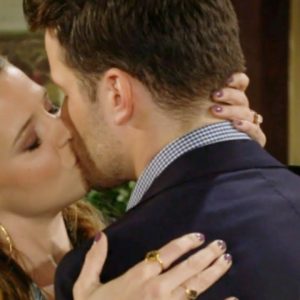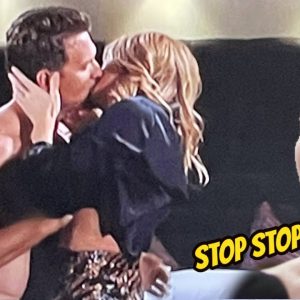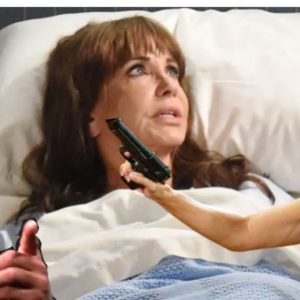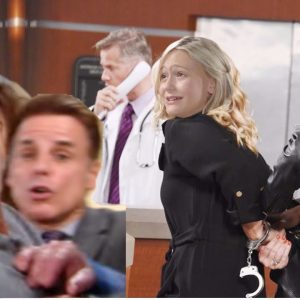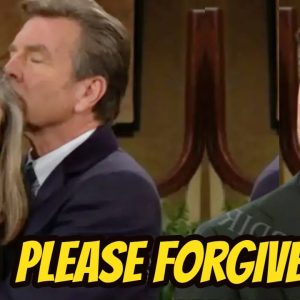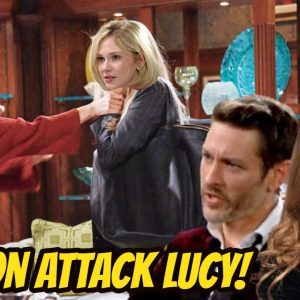In the gripping movie “The Young and the Restless,” tensions
reach a boiling point as Kyle Abbott faces a parent’s worst nightmare.
His son, Harrison, is involved in a severe accident, leaving him
hospitalized and fighting to recover. Kyle’s heart races as he paces the sterile corridors of the hospital, his mind a whirlwind of anger, fear, and regret. The sight of his beloved son, bruised and bandaged, fuels his determination to protect Harrison at all costs.
Kyle’s anger is directed entirely at Summer, his estranged wife, who he believes is responsible for the accident. It had only been a day since Summer had taken Harrison for her court-mandated visitation, and Kyle never imagined his son would end up in a hospital bed. Overwhelmed by a mix of emotions, Kyle resolves to take legal action, filing a lawsuit against Summer for full custody of Harrison. Convinced his son is safer with him and his new partner, Claire, Kyle argues passionately, “One day with Summer and he’s in a hospital bed. This can’t go on.”
The legal battle begins swiftly, with Kyle hiring the best lawyer he can find. The initial hearings are tense, with both sides presenting their arguments passionately. Kyle’s lawyer argues, “Your Honor, Harrison Abbott deserves a stable and secure environment. Under Kyle’s care, Harrison has thrived. The accident occurred under Summer’s watch, highlighting a pattern of negligence that cannot be ignored.”
Summer, however, is equally determined to fight back. She hires her own legal team and prepares to defend herself against Kyle’s accusations. “I love my son more than anything,” Summer insists. “This was an accident, a terrible accident, but it doesn’t mean I’m unfit to be his mother.”
As the case progresses, the courtroom becomes a battleground, drawing friends and family into the conflict and forcing them to take sides. Summer’s parents, Phyllis and Nick, are unwavering in their support for their daughter, believing Kyle’s actions are driven by spite. Phyllis confronts Kyle in the hallway outside the courtroom, accusing him of overreacting to a tragic accident. “How dare you accuse Summer of being a bad mother?” she demands. “She’s doing the best she can.”
Kyle, his patience worn thin, snaps back, “The best she can? Harrison is in the hospital because of her.”
The tension between them reaches a boiling point one evening during a heated argument at the hospital. In a moment of sheer frustration, Kyle loses control and slaps Summer across the face. The sound of the slap reverberates through the hallway, stunning everyone present into silence. Summer’s eyes widen in shock, then narrow in fury. “That’s it, Kyle. You’ve crossed the line,” she hisses, her voice trembling with rage. “I’m not letting you get away with this.”
Phyllis and Nick, who witness the altercation, are livid. “How dare you lay a hand on our daughter!” Nick shouts, stepping between them. “You’ll regret this, Kyle.”
The incident only intensifies the legal battle. Summer’s legal team quickly files for a restraining order against Kyle, painting him as violent and unstable. The judge now has to consider not only the accident but also Kyle’s behavior in determining custody.
Meanwhile, Harrison’s condition gradually improves, and he is finally discharged from the hospital. However, the emotional scars from the accident and the ensuing conflict between his parents run deep. Kyle and Summer’s once amicable co-parenting relationship deteriorates into a bitter feud. The custody battle drags on for months, with each side refusing to yield, both convinced they are the best parent for Harrison.
The courtroom becomes a stage for their personal grievances, with each hearing exposing more of their animosity and distrust. Friends and family are torn. Claire stands by Kyle, believing his actions are motivated by genuine concern for Harrison’s well-being. Phyllis and Nick, on the other hand, steadfastly defend Summer, insisting she is a loving and capable mother.
The judge, burdened with the task of deciding Harrison’s future, listens carefully to both sides. Testimony from doctors, child psychologists, and family members paints a complex picture. Harrison needs stability and care, but determining which parent can provide that is a daunting task. In the end, the judge’s decision is a nuanced one. Custody is awarded jointly, with strict conditions in place to ensure Harrison’s safety and well-being.
As the dust settles, the emotional toll on everyone involved is evident. The once united family is now fractured, each member dealing with the fallout in their own way. The movie concludes with a sense of unresolved tension, leaving viewers to ponder the lasting impact of the events on Harrison’s young life and the future of the Abbott family.
